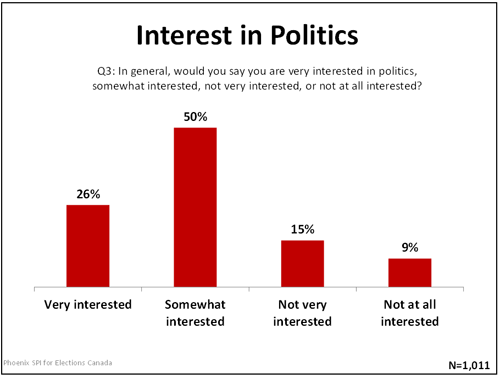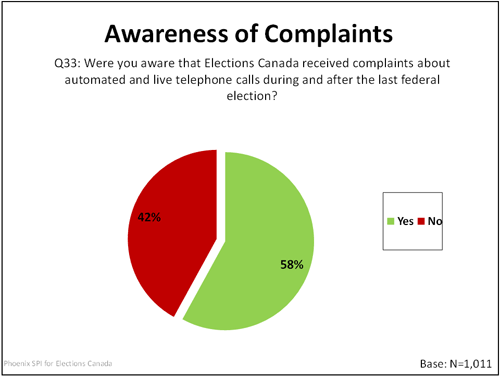Survey of Electors on Communications with Electors
Interest in Politics and Awareness of Complaints about Telephone Calls
This section explores respondents' interest in politics and their awareness of complaints.
Most Report Some Interest in Politics
Roughly three quarters (76%) of electors said they have at least some interest in politics. Exactly half claimed to be somewhat interested and 26% very interested. Conversely, 15% have little interest in politics, with 9% having no interest in it at all.

Text description of "Interest in Politics" graph
These results are identical to those reported in 2008 following the 40th federal general election, and only slightly lower than was reported in 2011 following the 41st general election (81% vs. 76% in 2012). It is worth noting, however, that the target audiences are not identical. This study included all eligible electors, while the surveys following the 40th and 41st federal general elections included only eligible electors at the time of the general election.
Canadians with high levels of political interest tend not only to be more politically engaged than Canadians with less political interest, but also tend to regard the political and electoral system more favourably. In terms of engagement, they are more likely than those with less interest in politics to report having voted in the last federal election (90% vs. 59%), to identify with a federal political party (48% vs. 14%), and to use the Internet for a variety of political-related purposes (9% vs. 3% use it for all three purposes asked about).
In terms of their perspectives, Canadians who are more interested in politics are more likely than those with less political interest to have positive reactions to being contacted by political parties and candidates (73% vs. 48%), have higher levels of trust in federal election results (87% vs. 76%), think federal political parties and candidates use personal information appropriately (34% vs. 23%), be favourable toward being contacted by political parties and candidates for various purposes (24% vs. 14% find all four purposes asked about appropriate), have confidence in the institutions involved in the electoral system (30% vs. 21% have confidence in all institutions asked about), and think Elections Canada ran the election fairly (87% vs. 79%).
Socio-demographic Differences
The likelihood of being very or somewhat interested in politics increased with age, from 58% of youth aged 18-24 to 87% of those aged 55 and over. Interest also increased with formal education, from 63% of those with an high school education or less to 87% of university graduates.
Political interest was higher amongst Internet users (78% vs. 69% of non-users) and Canadians from households with both a cell phone and a landline (81%). Conversely, it was lower amongst cell phone-only households (54%).
End of boxAwareness of Complaints about Telephone Calls
Canadians were also asked whether they were aware that Elections Canada received complaints about automated and live telephone calls during and after the last federal general election. Most Canadians (58%) were aware of these complaints, while 42% were not.

Text description of "Awareness of Complaints" graph
The extent to which awareness of the complaints received by Elections Canada and the circumstances surrounding those complaints has had an impact on Canadians' confidence in the electoral process and various players in that process cannot be determined here. However, it can be said that awareness of these complaints does not correlate with lower levels of trust in federal election results or reduced likelihood to think that Elections Canada ran the election fairly (in fact, those who were aware of the complaints were more likely than those not aware to think Elections Canada ran the election very fairly (48% vs. 36%), though no more or less likely to think they ran it fairly in general). Additionally, those who were aware of the complaints were more likely than those who were not to have high levels of confidence in Elections Canada (84% vs. 73%), federal political parties (84% vs. 73%), and the judiciary (67% vs. 51%).
It appears as though Canadians who are aware of the complaints received by Elections Canada are generally those Canadians who are more broadly interested and engaged in politics. These Canadians also tend to be those with relatively high levels of trust and confidence in the system. Overall, they also tend to favour protecting personal privacy in a tradeoff against the need for political parties to communicate with electors and think that political parties should be regulated by privacy laws.
Socio-demographic Differences
The likelihood of being aware of such complaints increased with age and formal education. Youth aged 18-24 were the least likely to be aware of these complaints (22%), followed by those aged 25-34 (57%), those 35-54 (63%), and was highest amongst those 55 and over (64%). It was also lowest amongst those with high school education or less (47%), followed by those with college or some university education (51%), and was highest amongst those who had completed university (72%).
Additionally, the likelihood of being aware of such complaints was highest amongst the following demographic subgroups:
- Those who are retired or otherwise not in the workforce and the employed (59-61% vs. 35-41% of students and the unemployed).
- Men (62% vs. 54% of women).
- Anglophones (62% vs. 54% of Francophones).
- Internet users (60% vs. 48% of non-users).
- Members of households with both a landline and a cell phone (63% vs. 43-49% of others). It was lowest amongst cell phone-only households (43%).
Attitudinal and Experiential Differences
In terms of the relationship between Canadians' awareness of these complaints and their other attitudes and experiences, the likelihood of being aware of these complaints was highest amongst:
- Those with higher levels of political interest (64% vs. 36% with lower levels).
- Those who think political parties and candidates should be regulated by privacy laws (62% vs. 51% who think they should self-regulate).
- Those who favour the protection of privacy in a tradeoff against the need for political parties to communicate with electors (61% vs. 49% who favour the need for communication).
- Those who report having voted in the last federal general election (66% vs. 47% who did not).
- Those with very high levels of trust in federal election results (67% vs. 52-53% of others).
- Those who identify with a particular federal political party (72% vs. 49% who do not).
